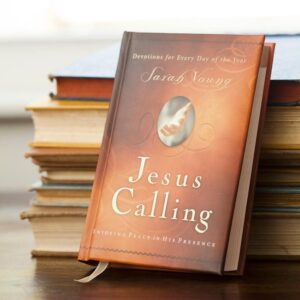
When I first heard the Gospel and believed, I knew I was washed clean and forgiven. But I didn’t have anyone who really understood the full and complete Gospel to disciple me. Nor did my husband. We had just come out of the Catholic system and were on our second or third seekermergent church (hey, we liked the music!), when the Lord graciously opened our eyes to the Scriptures and the truth of who He is – and who we aren’t!
Still, without proper discipleship, we got caught up in all the glitz and programs of today’s celebrity-driven church “bible” studies. The ones that told me if I just did these 12 things, or adopted these 7 habits, my life would be so much better. I’d be more organized/joyful/tolerant/smart/generous/relaxed, and less angry/sad/busy/ignorant/unloving/greedy/anxious. I’m about to share a book review on just one of the many church studies out there that really aren’t Bible studies at all. It’s one of many books failing to make a clear distinction between the doctrines of Law and the Gospel, which promises the forgiveness of sins in light of the person and work of Jesus Christ.
Like everyone else, I thought that the celebrity writers of these bright, flowery studies were biblical. They certainly contained some familiar Bible verses and talked about God – and sometimes Jesus. But the narrative almost always seemed to point to the author, and her life, and her countless anecdotes about her kids, her husband, her failings, and her overcomings. These anecdotes were a highly entertaining path for me. Not toward confession and repentance from my disobedience, but toward legalism and rigid actions which ultimately would lead me to “feel” closer to God.
These days I will not lay my money down for any of the numerous book studies being cranked out for conferences, written by women about their experiences. I want the real deal. So I study Scripture with other women. But women I love still gather by the dozens to study the latest ramblings by celebrities, one of them being Jen Hatmaker. Blogger Elizabeth Prata wrote this review of Jen’s book, “7: An Experimental Mutiny Against Excess”:
Book Review & Discernment- “7: An Experimental Mutiny Against Excess” by Jen Hatmaker, part 1 Part 2 here
The Shack got women talking. The Secret titillated them. A Thousand Gifts made them swoon. Now, 7:An Experimental Mutiny Against Excess by Jen Hatmaker is causing another stir among the female brethren. Here is the Amazon.com book blurb:
American life can be excessive, to say the least. That’s what Jen Hatmaker had to admit after taking in hurricane victims who commented on the extravagance of her family’s upper middle class home. She once considered herself unmotivated by the lure of prosperity, but upon being called “rich” by an undeniably poor child, evidence to the contrary mounted, and a social experiment turned spiritual was born.”
“7 is the true story of how Jen (along with her husband and her children to varying degrees) took seven months, identified seven areas of excess, and made seven simple choices to fight back against the modern-day diseases of greed, materialism, and overindulgence.”
“Food. Clothes. Spending. Media. Possessions. Waste. Stress. They would spend thirty days on each topic, boiling it down to the number seven. Only eat seven foods, wear seven articles of clothing, and spend money in seven places. Eliminate use of seven media types, give away seven things each day for one month, adopt seven green habits, and observe “seven sacred pauses.” So, what’s the payoff from living a deeply reduced life? It’s the discovery of a greatly increased God—a call toward Christ-like simplicity and generosity that transcends social experiment to become a radically better existence.”
Where do I begin.
OK, as always begin with the language that is being presented and carefully scrutinize it, and then compare it to the bible.
First, the impetus of the book worrisome. A kid called them ‘rich’ so they changed their life? Were they ashamed to be called rich by a poor child? Guilty of the blessings God had sent them? If they were prosperous in contrast to a poor kid, then it was an opportunity to do more with their means. It is not a sin to be rich, even by comparison to others. Abraham was wealthy. So was Job. David. Solomon. Nicodemus. Joseph of Arithamea. Joanna the wife of Chuza, the manager of Herod’s household, and Susanna; helped Jesus out of their own means. (Luke 8:3). It is the love of money that rots. Was this family loving money too much? Or just ashamed of what they had? There is a difference.
If they were attempting to shepherd their means in more Godly fashion, then that is fine. But it seemed that they were ashamed of their status in life. The bible has much to say about money, Godly living, shepherding resources, and excess, yet they did not consult with the word. They are off to a bad start.
What was their source for proceeding? They created a man-made outline to guide their behavior rather than consult the bible. By what standards did they decide on seven? On food, clothing, spending? What about giving?
Stress? Stress is part of life. Ask Paul. Peter. Stephen. Any martyr. Any Christian. We are at war with the powers and principalities of this world, and that is stressful. Do they think they deserve a stress-free life? What was the source of their stress? If they had made unGodly decisions about work, to the expense of their children, that is one matter. If they simply want the ‘good life’ that is another. Achieving it by man-made means and monastic ‘simplicity’ is not the way.
We have had a wave of these try harder “faith” type books these last couple of years. We suffered through Year of Living Biblically by AJ Jacobs and A Year of Biblical Womanhood Rachel Held Evans. In my opinion, this current wave of ‘do something, try harder, strip away the consumerism so we can get close to God’ kind of books began with David Platt’s “Radical: Taking Back Your Faith from the American Dream.” That was a book that made it seem like those who were not doing big and bold things for God and coming home after work to sit on their American couch were second rate.
This past January, I wrote,
“You might remember I talked about the time when David Platt’s book Radical: Taking Back Your Faith from the American Dream came out. Christians all over the place got on the bandwagon and decided that their plain-jane faith was unremarkable and they needed an adrenaline shot of daring and a radical change to prove to God that they’re really a Christian who means it. Let’s contrast the fancy lights and high volume indoctrination of charismatic faith preached at Passion 2013 with this-” and I linked to John MacArthur’s posting of an essay called “An Unremarkable Faith“(written by Tommy Clayton).
MacArthur’s essay extolled the virtues of a plain old Godly life lived by biblical standards (which is actually harder to do than sell everything and run off to Burma.). And I mentioned Radical again this past March, referencing Southern View Chapel’s treatment of Platt’s book in fall of 2011. They write,
“A similar voice is David Platt’s and his book Radical: [Taking Back Your Faith from the American Dream]. Platt offers better balance than Chan but still propagates a two-tiered gospel composed of the true gospel of redemption and the social gospel. While Platt is careful to elevate the true gospel, the social gospel of feeding the hungry and giving to the poor is the primary focus of the book and accounts for its popularity.[26] He writes, “As we meet needs on earth, we are proclaiming a gospel that transforms lives for eternity.”[27] The author does not advocate the social agenda as opposed to true evangelism, as mentioned above, but he does say that caring for the poor is evidence of salvation. As a matter of fact “rich people who neglect the poor are not the people of God.”[28] However, when we turn to the New Testament, we find that, while Christians are to be loving and generous to all people, they are never told to attempt to remedy the consequences of the sin of unbelieving humanity through social action.”
7:An Experimental Mutiny Against Excess is a natural outgrowth of books like Platt’s Radical. We can see influences of Platt in the blurb when we read that following the author’s example will lead to “a radically better existence.”
Are we to seek a radically better existence for ourselves on this earth? It is not our home. It is our battleground. Are we to seek a radically better existence for others on this earth through experiments like social gospel? No. Better their book be titled “An Experimental Mutiny Against Sin“ because that is what Christians are called to do, witness for Christ against sin and Him alone as the way to overcome it.
I sidetracked about the Jacobs, Evans, and Platt books because I wanted you to see how these things are connected in waves. Platt’s book was seminal and damaging. We see that now.
Back to An Experimental Mutiny Against Excess. The blurb says the family discovered that once they dispensed with their stuff, they found “a greatly increased God”? So, God ‘increases’ if we recycle? People, God doesn’t change depending on what WE do.
The phrase in the blurb says it all: “a social experiment turned spiritual was born”. They didn’t consult the bible and adopt biblical standards in repentance and to seek God, they performed legalistic and rigid actions and a byproduct of that was that their own experience seemed to bring them closer to God. It’s backwards. That is how one knows they are false.
Now, let’s see what the bible has to say about riches.
Let’s substitute Abraham’s name for their name and see if this social experiment makes as much sense. From the blurb:
American life can be excessive, to say the least. That’s what Jen Hatmaker had to admit after taking in hurricane victims who commented on the extravagance of her family’s upper middle class home. She once considered herself unmotivated by the lure of prosperity, but upon being called “rich” by an undeniably poor child, evidence to the contrary mounted, and a social experiment turned spiritual was born.
From the bible-
Now Abram was very rich in livestock, in silver, and in gold. And he journeyed on from theNegeb as far as Bethel to the place where his tent had been at the beginning, between Bethel and Ai, to the place where he had made an altar at the first. And there Abram called upon the name of the Lord. (Gen 13:2-4).
Blending the two-
“And Abram was called “rich” by a poor slave from Pharaoh’s house and Abram felt guilty for his excesses. And lo, Abram chose the number seven and gave 7 cows to the child, and 7 pieces of silver to the beggar by the gate and 7 pieces of gold to the cripple by the road. And a grand social experiment was born, and behold, Abram felt closer to God and God was increased because of Abram’s works.”
BAH HA HA HA — stupid, eh?
Now, it is not stupid to shepherd your means wisely. It is not stupid to care for the poor. It is not stupid to have compassion on those less fortunate. All those things are good. We are reminded of the Parable of the Talents (Matthew 25:14-30). Some people are richer than others and that is the way God set it up (Matthew 25:15). It is what we do with what we have that He is looking for. (Matthew 24:28). How we go about witnessing for Jesus regarding those important topics is what matters. How we share our means is what is at stake. Is what we are doing for the right reasons and done in the right way? Because there are right and wrong reasons and a right and a wrong way, as the parable shows.
In the next part of this book review, I’ll explore what the reference in the book’s “seven sacred pauses” means. The meat of the problem with the book “7: An experimental Mutiny Against Excess” is contained in that phrase, and I’ll explicitly tell you why this ‘discipline’ is very, very bad. Is what we are doing for the cause of Christ Godly and deep, grounded in His word? Or is what we are doing for the cause of Christ superficial and wrong headed, off track and thus of the kingdom of darkness? This book is in the latter group and in the next part I’ll clearly show you how they went about it in the wrong way, and thus why the book is to be avoided.



Good article. We are accepted by God because of Christ’s work, not because we made some law for ourselves and then kept it. God working within us should prompt us to do those good things, we don’t set up a set of rules for ourselves and then say we are good Christians because we kept our self imposed rules.
In your next post maybe discuss matt 25 more and the social gospel. Since Matthew 25 Jesus is talking about taking care of believers not the world.
I appreciate this. Good insights into the latest manifestation of legalism. You may also know about Ron Sider’s “Rich Christian in an Age of Hunger?” and David Chilton’s response “Productive Christians in an Age of Guilt Manipulators?” Just thought you might like to know about these as it’s just the latest cycle of being “hip.”
Editing note: the article “An Unremarkable Faith” was actually written by Tommy Clayton. John MacArthur is quoted in the article, but is not the author.
Wow, all these wonderful “How to” books about Christianity! Makes my well-thumbed bible seem very boring and out of date. Guess I’d better move with the times.
Did you read this book? It seems as though the article is written just off Amazon’s description.